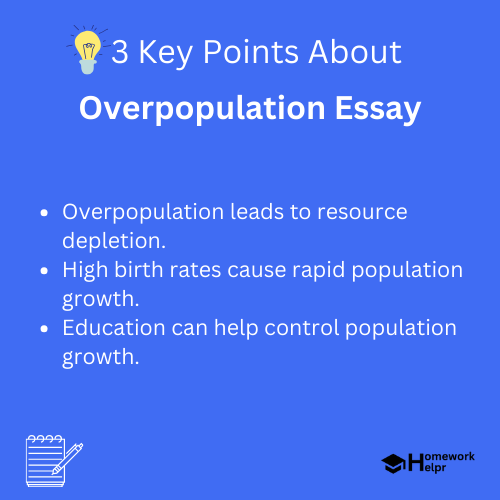📝 Summary
Overpopulation is a condition where population growth surpasses the environment’s ability to sustain its inhabitants. This leads to numerous challenges: resource depletion, environmental degradation, and increased poverty levels. Key causes include decreased mortality rates, high birth rates, and immigration. The impacts are profound, ranging from scarcity of essential resources to climate change. However, potential solutions like education on family planning, effective government policies, and technological innovations offer hope. Addressing overpopulation is crucial for a sustainable future for our planet.}
Overpopulation: A Growing Concern
Overpopulation is a term that refers to a situation where the number of people exceeds the capacity of the environment to sustain them. It presents numerous challenges, including a strain on resources, deterioration of the environment, and an increase in poverty levels. Understanding the causes, effects, and solutions to overpopulation is vital for shaping a better future for our planet.
What Causes Overpopulation?
Understanding the causes of overpopulation requires an examination of various factors that contribute to rapid population growth. Some of the primary causes include:
- Decreased Mortality Rates: Advances in healthcare, hygiene, and nutrition have led to longer lifespans.
- High Birth Rates: In many developing countries, cultural norms and lack of access to family planning contribute to high birth rates.
- Immigration: Migration from one place to another can lead to localized population booms.
The phenomenon of decreased mortality rates, especially with the advent of modern medicine, has significantly contributed to the global population. Innovations in vaccine development and healthcare practices have reduced the number of deaths, thereby allowing populations to grow exponentially.
Definition
Mortality Rates: The frequency of occurrence of death in a defined population during a specified interval.
Examples
For instance, in the 20th century, the introduction of antibiotics saved millions of lives globally, contributing to population growth.
Effects of Overpopulation
As the population continues to grow, we see significant impacts on our planet and society. Some notable effects include:
- Resource Depletion: Essential resources such as water, food, and energy become increasingly scarce.
- Environmental Degradation: Overpopulation accelerates pollution and habitat destruction.
- Economic Challenges: High population growth often leads to high unemployment rates and poverty.
Resource depletion is one of the most alarming effects of overpopulation. The more people there are, the greater the demand for food, clean water, and energy, ultimately leading to scarcity. This scarcity can result in conflict and instability within regions.
Definition
Resource Depletion: The consumption of a resource faster than it can be replenished.
Examples
For example, overfishing has led to a significant decline in fish populations in many oceans, affecting marine ecosystems and human livelihoods.
Environmental Impact
The environmental effects of overpopulation are profound and multifaceted. Overpopulation contributes significantly to:
- Air Pollution: Increased industrial activity and vehicle emissions lead to polluted air.
- Deforestation: More land is cleared for farming and habitation, disrupting ecosystems.
- Climate Change: More people mean more greenhouse gas emissions, accelerating global warming.
One clear example of environmental degradation is deforestation. As populations expand, forests are cleared to make way for agriculture or urban development, contributing to lost biodiversity and increased carbon dioxide levels in the atmosphere.
❓Did You Know?
As of 2023, there are over 8 billion people on Earth, and the population is expected to reach around 10 billion by 2050!
Solutions to Overpopulation
While overpopulation poses significant challenges, several solutions can help mitigate its effects. These include:
- Education: Raising awareness about family planning and reproductive health.
- Government Policies: Implementing and enforcing policies to control population growth.
- Technological Innovations: Investing in technology for sustainable agricultural practices.
Education is a cornerstone in addressing overpopulation. When communities are educated about family planning and reproductive health, individuals tend to choose smaller families. This informational outreach can have lasting impacts on population growth.
Definition
Reproductive Health: A state of complete physical, mental, and social well-being in matters relating to the reproductive system.
Examples
For example, countries like Nigeria and Bangladesh have initiated educational campaigns to teach family planning methods, resulting in reduced birth rates over time.
Economic Implications of Overpopulation
The economic impacts of overpopulation are far-reaching. Some of the economic implications include:
- Job Scarcity: Increased competition for limited jobs leads to higher unemployment rates.
- Strain on Public Services: Overpopulation strains healthcare, education, and public transport systems.
- Poverty Increase: Economic opportunities become limited, leading to greater poverty levels.
The strain on public services makes it difficult for governments to provide adequate healthcare and education. As populations grow, the need for housing, schools, and hospitals outweighs supply, leading to overcrowding and diminishing quality of life.
Definition
Overcrowding: The state of being filled beyond normal or suitable capacity.
Examples
For instance, cities like Bangalore and Manila face significant challenges due to overcrowded schools and hospitals, leading to decreased educational outcomes and health risks.
Conclusion
Overpopulation remains a critical issue that requires immediate attention. The effects of overpopulation touch every aspect of society, from the economy to the environment. While the causes may vary, the solutions are achievable through collective efforts in education, policy-making, and technological advancement. By addressing overpopulation, we can work towards a healthier, more sustainable planet for generations to come.

Related Questions on Overpopulation Essay
What is overpopulation?
Answer: Overpopulation occurs when population exceeds resource capacity.
What are the primary causes of overpopulation?
Answer: Main causes include high birth rates and decreased mortality rates.
What are the effects of overpopulation?
Answer: Effects include resource depletion, poverty, and environmental degradation.
How can we solve overpopulation?
Answer: Education, policies, and technology can help mitigate overpopulation.
